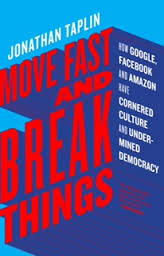Hugh Stephens Blog: Jonathan Taplin’s “Move Fast and Break Things”: A Sombre Warning—And a Call for Action
Jonathan Taplin’s new book Move Fast and Break Things, published in April of this year, (the title is based on Facebook’s internal motto, since modified to make the company appear more responsible) has been attracting considerable attention as he embarks on the usual book launch media tour, in this case Down Under in Australia and New Zealand, and in the UK. Taplin’s core message is enshrined in the subtitle to the book, “How Facebook, Google and Amazon Cornered Culture and Undermined Democracy”. Those are pretty bold statements but Taplin, currently Director Emeritus of the Annenberg Innovation Lab at USC, builds a compelling case. He has a long and varied history in the entertainment business and can speak from experience, having been variously a manager of prominent bands in the 1960s (he was for a while full time tour manager for The Band), a film producer (his best known film is perhaps The Last Waltz), an investment banker working for Merrill Lynch, an entrepreneur who started an early video on demand service, Intertainer, that was arguably ahead of its time, and a writer and thinker on media and digital issues.
With permission of Little, Brown & Co.
Taplin takes us on a journey from pre-digital times to today, in the process covering a wide swathe of issues, from music piracy and the rise (and fall) of Napster to the digital disruption and now almost total domination of social media and search by Facebook and Google, to the commoditization of content exemplified by Amazon’s relentless driving down of book prices and the degrading of content into click-bait to promote online ads. The journey also stakes out some political ground; he takes particular issue with the libertarian philosophy embraced by many tech entrepreneurs (Peter Thiel comes in for special attention) and decries the regulatory capture that has allowed virtual monopolies like Google, Facebook and Amazon to thrive with little or no challenge from government.
Taplin points out the challenge that this concentration of information flow poses for a healthy democracy; the proliferation of “fake news” in the past US election being a case in point with both Facebook and Google playing the role of enablers of “alternate facts”, even if they did not intend to do so. Reputable journalism used to be the safeguard against fabrication and propaganda but the media industry, particularly print journalism, is reeling from the digital onslaught with ad dollars fleeing print for online distribution, while the journalists labour to produce expensive and verified content that is monetized by others–internet-based intermediaries.
Given his early background and still current interests, the music industry provides the lens through which Taplin starts his journey. He takes us through the decline of the music industry spurred by Sean Parker and the creation of Napster. Music has successfully moved online as we know yet, despite some revenue growth in recent years after precipitous declines, for the vast majority of musicians making a living is a struggle. Taplin singles out YouTube as a particular problem noting that, “YouTube is now the world’s dominant audio streaming platform, dwarfing Spotify and virtually every other service. Yet it pays artists and record companies less than a dollar per year for every user of recorded music, thanks to rampant piracy on its site”. This echoes the message delivered by many in the music business including Canadian songwriter and performer Miranda Mulholland in her recent address to the Economic Club of Canada, as I commented on in a recent blog.
In his comments in Australia, where there is a currently an active debate underway as to what direction copyright reform should take, with Google and others pushing for a looser “fair use” regime and extension of safe harbour protection to online entities hosting content while Australian creators are fighting back, Taplin urged Australians to hold the line. He particularly cautioned against expanding Australia’s safe harbour laws to include intermediaries such as search or other online content providers, who earn considerable income from the display of copyright infringing material posted by users. Current law is limited to protecting the ISPS (the so-called “dumb pipes”—entities that do not profit from hosting infringing material posted by users) against liability for such hosting, but not internet intermediaries like YouTube. To the question as to what Australians can do to show leadership, he pointed to the need to develop a system whereby infringing content, once taken down, stays down.
In the book Taplin also laments the decline of the news media, brought about by the fundamental restructuring of content distribution through the growth of online services like Facebook and Google. He points to the drastic decline in journalism employment and the number of dailies in the US and the resulting impact that the decline of a robust and independent media has on the functioning of democracy. This is a problem not just in the United States, but in most of the developed world.
As with music, a major issue is that the creators of news content are getting paid less and less for what they produce as consumers go online for their news fix, while revenues to the content aggregators (e.g. Google News) who provide access to but do not produce any news content increase exponentially. In Europe newspaper publishers have called for the institution of a “publishers right” which would give them copyright protection over their finished product (e.g. a daily edition of a newspaper, including the digital edition) similar to that enjoyed by music, film and software program producers who have the right to copyright finished works in their entirety. This would put them in a better position to negotiate payment with the content aggregators and, as I noted in earlier post, might help preserve the continued viability of news reporting, so essential for the effective functioning of our societies and political systems.
In Canada where daily newspapers are dying on the vine, with some major city dailies going to all-digital weekday editions, and others consolidating or closing, Canadian newspaper publishers have proposed the establishment of a government-funded Canadian Journalism Fund of $350 million (CAD) annually to help publishers support the cost of paying journalists salaries (the fund would support 35% of a journalist’s salary up to a specified ceiling). This proposal was quickly denounced by several prominent Canadian journalists who warned that making the media beholden to the public purse would inevitably limit the ability of the press to report freely, and the Trudeau government quickly announced that it is not contemplating the institution of any internet or broadband taxes to fund this or other initiatives for more broadband content.
What to do about the damage caused to content industries—whether music, news, books or film–by the internet aggregators is of course the big question. The problem is obvious; the remedies not so easy. Internet taxes punish the most vulnerable. Government subsidies are a double-edged sword. In news broadcasting, one option is for more support of public broadcasting. Establishing a public media system in the US that extends beyond NPR and PBS and incorporates TV, radio and online content is one of Taplin’s recommendations in his final chapter, Digital Renaissance.
In his conclusions, Taplin argues for decentralizing the Internet, as it was originally intended, and reversing the process of consolidation and monopolization. He takes aim at the DMCA safe harbour provisions that Google, YouTube, Twitter and Facebook “hide behind” and he calls for a stay-down system where the website would bear responsibility to keepcontent down once it has been marked for takedown. He argues for a clearer definition of fair use, with a set of guidelines issued by the US Copyright Office. He proposes that the Federal Trade Commission (FTC) take a hard look at Google’s business model whereby it is allowed to scrape and retain all the data of users—search and location history, purchase preferences, contacts etc. Finally he suggests that Google be reviewed, as AT&T was back in the 1920s, to see if it should be regulated as a public utility.
There are a lot of ideas here, some of which lie more within the realm of the possible than others. What is clear is that Taplin has produced a thoughtful and important work that has sparked plenty of discussion, whether overseas or in the US.
It is one of the conundrums of our age that the online content services like Google and Facebook have become such a part of our individual lives that they seem to be almost irreplaceable. At the same time, questions are being asked about how much of our individual privacy we should have to give up in return for the use of these services. Will we be forever the passive providers of personal data so that products and services can be marketed directly to us? And will content creators forever be destined to see their creative work used as a commodity to attract eyeballs to ads, without fair or indeed any payment?
The Internet is moving at lightning speed and it may yet be that the monopolization of social media, search and online sales by a handful of massive corporations is reaching a tipping point, and that demands for reshaping the regulatory landscape will be increasingly heard. This probably won’t happen during the current US Administration but at some point the pendulum is likely to reach its apex and start to swing the other way.
© Hugh Stephens, 2017. All Rights Reserved.
This post first appeared on Hugh Stephens blog: Jonathan Taplin’s “Move Fast and Break Things”: A Sombre Warning—And a Call for Action


